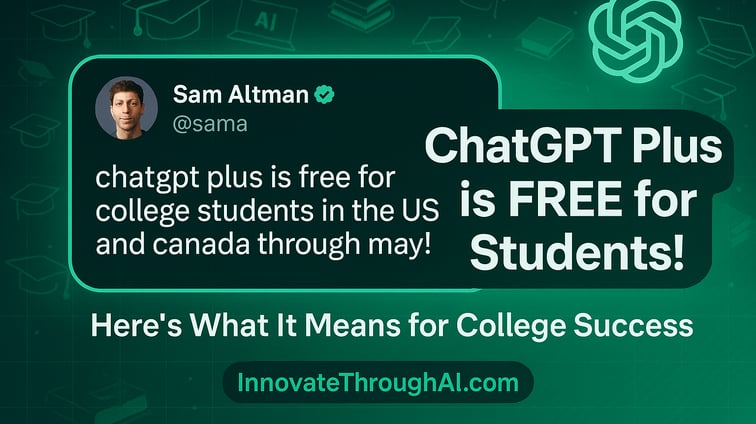ChatGPT Plus will be free for all college students in the United States and Canada through the month of May


What Did Sam Altman Announce?
On April 3, 2025, Sam Altman, CEO of OpenAI, made a major announcement on X (formerly Twitter) that quickly grabbed the attention of students and tech enthusiasts across North America. In a brief but impactful tweet, he revealed that ChatGPT Plus will be free for all college students in the United States and Canada through the month of May.
This move is part of OpenAI’s broader mission to make powerful AI tools more accessible to those who can benefit from them the most—starting with students. ChatGPT Plus, which typically costs $20/month, provides access to GPT-4, faster response times, and priority access during peak usage. For college students juggling assignments, research, and exams, this offer could be a game-changer.
While details on how to claim the free access are still rolling out, Altman’s announcement marks a significant shift toward democratizing access to advanced AI technology in academic spaces.
Implications for Digital Learning and Academic Success
Sam Altman’s announcement isn’t just a generous offer—it’s a signal of how AI is continuing to transform the landscape of higher education. By providing free access to ChatGPT Plus, OpenAI is lowering barriers for students who might not otherwise afford premium tools that can enhance their academic performance.
Here’s how this could impact digital learning and academic success:
1. Personalized Academic Support
With access to GPT-4 through ChatGPT Plus, students can receive on-demand explanations, tutoring, and writing support tailored to their individual learning styles. Whether it’s breaking down complex theories or helping revise essays, AI can act as a personalized study assistant available 24/7.
2. Leveling the Playing Field
Not all students have access to tutors, writing centers, or academic advisors. Free ChatGPT Plus helps close that gap, offering high-quality academic support regardless of a student’s background or institution. It’s a step toward more equitable learning opportunities.
3. Supporting Independent and Remote Learning
As universities continue to blend in-person and online education, tools like ChatGPT can help bridge learning gaps, especially for students managing asynchronous courses or working independently. The AI’s instant feedback and ability to generate explanations can complement self-paced learning.
4. Boosting Confidence and Reducing Burnout
AI assistance doesn’t replace hard work—it enhances it. For students overwhelmed with multiple assignments or those who struggle with writer’s block, having access to ChatGPT Plus can alleviate stress and help them produce better work faster, boosting confidence and reducing academic burnout.
What This Means for the Future of AI Access in Higher Ed
Sam Altman’s announcement of free ChatGPT Plus access for college students is more than just a temporary perk—it may be a sign of where higher education is heading in an AI-integrated world.
1. A Shift Toward AI-Enhanced Learning Environments
As more students gain hands-on experience with tools like ChatGPT, universities may need to adapt curricula and academic support services to integrate AI thoughtfully. Instructors could begin designing assignments that encourage critical engagement with AI or even teach students how to evaluate and refine AI-generated responses.
2. Increased Pressure on Institutions to Provide AI Tools
If students find value in AI tools, they may begin to expect their universities to offer them as standard resources—just like library access or learning management systems. This move by OpenAI could accelerate conversations about whether schools should formally adopt or subsidize access to AI tools as part of their academic toolkit.
3. A Push for Digital Equity in Tech Access
By making ChatGPT Plus free for a limited time, OpenAI is shining a light on the broader issue of access. As AI tools become more powerful and more integral to academic and professional success, ensuring equitable access across diverse student populations will become a growing priority for both tech companies and educational institutions.
4. Opening Doors for AI Literacy and Ethics Education
With AI now in students’ hands, there’s a growing need to teach AI literacy—how it works, how to use it responsibly, and what its limitations are. This includes conversations around academic integrity, data privacy, and how to think critically about AI-generated information. Institutions that get ahead of this curve will be better positioned to prepare students for the future workforce.
